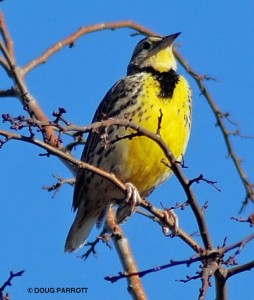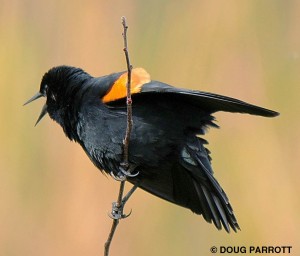The Western Meadowlarks who have been here all winter have begun tuning up their vocals for springtime concerts. You can hear them practicing in Hunn Meadow West (the prairie between Main Pond and Southwest Pond). They prefer to take center stage on the little pear tree in the field, although they also sometimes use a grass tussock nearby. I recommend that you bring your own seating (I use a folding camp stool) and attend a pre-concert. You won’t be disappointed. Meadowlarks are among the most musical of all birds, and our pair are especially talented.
Like all artists, though, they appear to have a sensitive soul when it comes to audience appreciation. I was enjoying one of their practice sessions two days ago when a distant cousin – a Red-winged Blackbird – flew in to perch on the pear tree stage. The blackbird listened to the meadowlarks for a brief time, then swelled himself up like a bagpipe about to burst and let loose with the distinctive tune of the Red-winged Blackbird: Okalee!
My grandmother used to say that appreciating bagpipe music took a special person. She had a theory it was genetic and skipped every other generation. She adored bagpipe music, but her daughter – my mother – thought pipers were worse than fingernails on blackboards. I play my beloved bagpipe music in my car so as not to inflict it onto my poor daughter, who is sure that bagpipes were invented so hunters could attract ducks by making them think they need to fly to the aid of what they perceive as a dying member of their flock.
So I love the bagpipey song of Red-winged Blackbirds, but hearing it as an accompaniment to the celestial fluting of the Western Meadowlarks was so incongruous I had to laugh out loud.
The meadowlarks, not liking this comment on their performance, huffed up their shoulders and flew off. The blackbird kept singing. I guess he was too into his own music to notice he had lost two members of the trio. I think this is a common occurrence among bagpipers.


